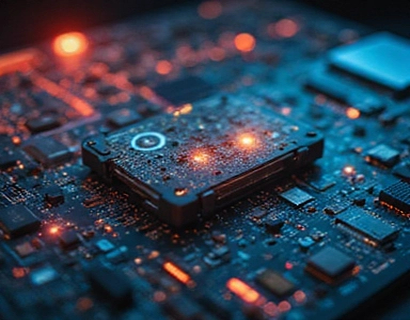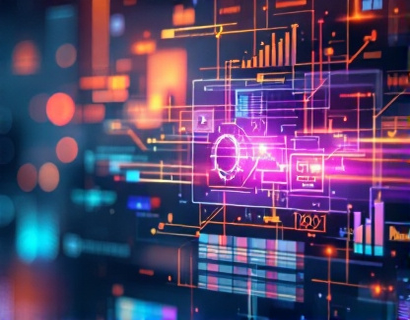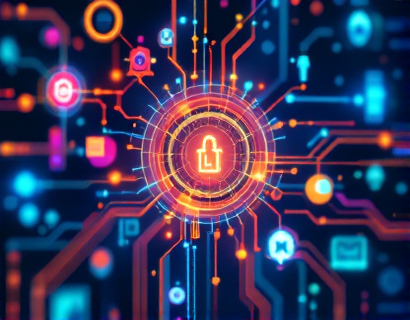AI and Crypto: Pioneering Financial Innovation for the Digital Age
The intersection of artificial intelligence and cryptocurrency represents a groundbreaking convergence of technologies that is redefining the landscape of finance. This synergy is not just a novel concept but a transformative force that is reshaping how we perceive, interact with, and benefit from digital currencies and financial services. As we delve into this topic, it's essential to understand the foundational elements of both AI and cryptocurrency, and how their integration is paving the way for a more efficient, secure, and user-friendly financial ecosystem.
Understanding Artificial Intelligence in Finance
Artificial intelligence, or AI, refers to the simulation of human intelligence processes by machines, particularly computer systems. These processes include learning, reasoning, problem-solving, perception, and language understanding. In the context of finance, AI technologies such as machine learning, natural language processing, and predictive analytics are being harnessed to automate and optimize various financial tasks. For instance, AI algorithms can analyze vast amounts of market data to identify trends, predict price movements, and make informed investment decisions. This capability is particularly valuable in the volatile world of cryptocurrency, where rapid price fluctuations and high uncertainty are the norm.
One of the most significant applications of AI in finance is in the realm of risk management. AI models can process and analyze complex datasets to assess and mitigate risks associated with investments, transactions, and operational processes. For cryptocurrencies, this means enhanced security measures to protect against fraud, hacking, and other cyber threats. AI-driven systems can detect unusual patterns and anomalies in real-time, enabling swift action to safeguard user assets.
Cryptocurrency: A New Paradigm in Digital Finance
Cryptocurrency, often referred to as digital or virtual currency, operates on a decentralized network using blockchain technology. Unlike traditional fiat currencies, which are issued and regulated by central banks, cryptocurrencies like Bitcoin, Ethereum, and others are created and managed through a distributed ledger that ensures transparency, security, and immutability. This decentralized nature eliminates the need for intermediaries such as banks, reducing transaction costs and increasing the speed of financial transactions.
The adoption of cryptocurrency has surged in recent years, driven by its potential to democratize finance, provide financial inclusion, and offer a hedge against inflation and economic instability. However, the nascent nature of cryptocurrency also brings challenges, including regulatory uncertainty, scalability issues, and technological complexities. This is where AI comes into play, offering solutions to these challenges and enhancing the overall user experience.
AI-Enhanced Cryptocurrency Trading
One of the most exciting areas where AI and cryptocurrency intersect is in trading. AI algorithms can analyze historical price data, market sentiment, and various other factors to generate trading signals and execute trades automatically. This form of algorithmic trading, often referred to as algorithmic or quantitative trading, leverages the computational power of AI to process information faster and more accurately than human traders.
For example, machine learning models can be trained to recognize patterns and trends in cryptocurrency markets, enabling them to make predictions about future price movements. These models can adapt and learn from new data, continuously improving their accuracy over time. Additionally, AI can help manage trading strategies by optimizing position sizing, risk management, and portfolio diversification. This level of automation and precision is particularly beneficial for retail traders who may lack the expertise or resources to navigate the complexities of cryptocurrency markets manually.
Smart Contracts and Decentralized Applications
Smart contracts are self-executing contracts with the terms of the agreement directly written into code. They run on blockchain networks and automatically enforce and execute the terms of the contract when predefined conditions are met. AI can enhance smart contracts by adding layers of intelligence and adaptability. For instance, AI can be used to analyze real-time data and dynamically adjust the parameters of a smart contract, ensuring that it remains optimal and responsive to changing market conditions.
Decentralized applications (dApps) built on blockchain platforms can also benefit from AI integration. dApps are applications that run on decentralized networks, offering users more control and privacy compared to traditional centralized applications. AI can improve the functionality and user experience of dApps by providing personalized recommendations, enhancing user interfaces, and enabling more sophisticated features such as natural language interaction and predictive analytics. This synergy between AI and blockchain technology is paving the way for a new generation of secure, transparent, and intelligent financial applications.
Enhancing Security with AI
Security is a paramount concern in the cryptocurrency space, given the high value and sensitivity of digital assets. AI plays a crucial role in bolstering security measures by identifying and mitigating threats more effectively than traditional methods. Machine learning algorithms can analyze transaction patterns, user behavior, and network activity to detect anomalies and potential security breaches in real-time. This proactive approach to security is essential for building trust and confidence in cryptocurrency platforms and services.
Furthermore, AI can be used to develop advanced encryption techniques and cryptographic protocols that enhance the security of transactions and data storage. For instance, AI-driven key management systems can generate and manage cryptographic keys with higher complexity and security, reducing the risk of key compromise. Additionally, AI can assist in the development of zero-knowledge proofs, a cryptographic method that allows one party to prove to another that a statement is true without revealing any information beyond the truth of that statement. This technology can significantly enhance privacy and security in blockchain transactions.
Personalized Financial Services
The integration of AI and cryptocurrency is not only about improving trading and security but also about providing personalized financial services tailored to individual needs and preferences. AI algorithms can analyze user data, including transaction history, investment goals, and risk tolerance, to offer customized financial advice and recommendations. This personalized approach can help users make more informed decisions and achieve their financial objectives more effectively.
For example, AI-powered financial advisors can provide real-time insights and suggestions based on the user's current market conditions and financial situation. These advisors can also monitor market trends and adjust investment strategies accordingly, ensuring that users stay aligned with their long-term goals. Additionally, AI can facilitate the creation of customized cryptocurrency portfolios, optimizing asset allocation and maximizing returns while managing risk.
Challenges and Considerations
While the potential benefits of AI in the cryptocurrency space are substantial, there are also challenges and considerations that need to be addressed. One of the primary concerns is the regulatory landscape. The intersection of AI and cryptocurrency operates in a relatively uncharted territory, with regulations still evolving in many jurisdictions. Ensuring compliance with existing laws and adapting to new regulatory requirements is crucial for the sustainable growth of AI-enhanced cryptocurrency services.
Another challenge is the technical complexity involved in integrating AI with blockchain technology. Developing robust and scalable AI models that can operate efficiently on decentralized networks requires significant expertise and resources. Moreover, the transparency and immutability of blockchain can sometimes conflict with the need for data privacy and the iterative nature of AI model training. Balancing these aspects is essential to create a seamless and secure user experience.
Future Prospects
The future of AI and cryptocurrency is promising, with numerous potential developments on the horizon. As AI technologies continue to advance, we can expect even more sophisticated and efficient solutions in areas such as trading, security, and personalized services. The integration of AI with other emerging technologies, such as quantum computing and the Internet of Things (IoT), could further revolutionize the financial landscape.
Moreover, the growing adoption of cryptocurrency and the increasing acceptance of blockchain technology by mainstream institutions signal a shift towards a more decentralized and inclusive financial system. AI will play a pivotal role in this transition, driving innovation and enhancing the overall user experience. As more people recognize the benefits of AI-enhanced cryptocurrency solutions, we can anticipate a surge in adoption and a more vibrant and dynamic financial ecosystem.
In conclusion, the merging of AI and cryptocurrency represents a transformative force in the digital age. By leveraging the strengths of both technologies, we can create more efficient, secure, and personalized financial services that cater to the needs of tech-savvy users and innovators. As we continue to explore and harness this synergy, the future of finance looks brighter and more promising than ever.










































